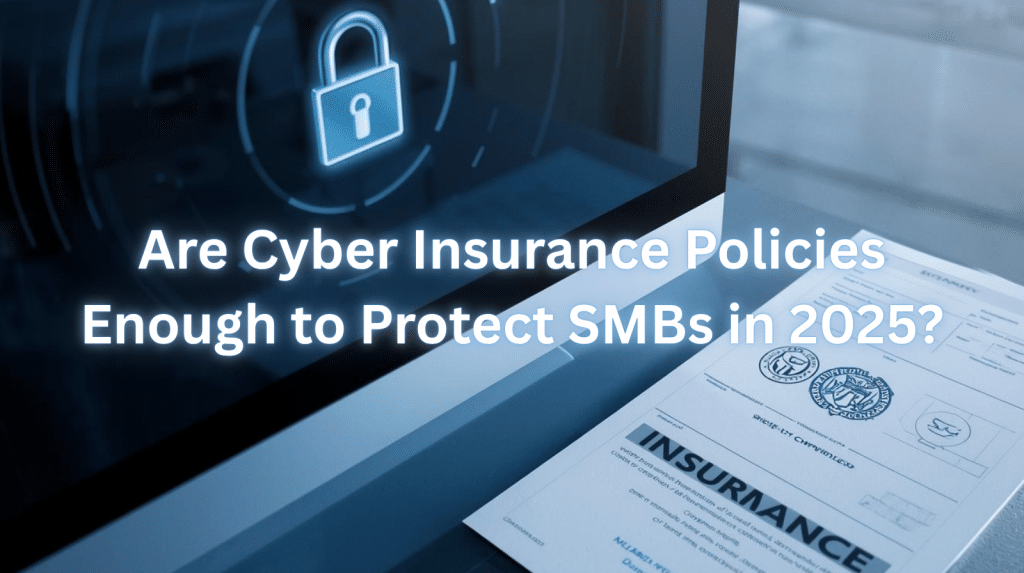According to trends, in the next five years, U.S. small and medium-sized businesses (SMBs) will be increasingly exposed to cyber risks. This will pose a risk not just to their data but also to their financial stability and business sustainability as a whole. Because of this, owners are trying to be proactive by getting cyber insurance for small businesses, USA. However, the belief that this will fully protect their company even after a breach is a dangerous assumption.

cyber insurance for small businesses, USA
Here at EB Solution, we have observed the development of cybersecurity threats. Businesses can no longer be safeguarded solely by cyber insurance for small businesses, USA. It is not a matter of whether or not you are covered by the policy but rather if the SMB cybersecurity coverage is robust enough to handle the current digital threats.
The Rising Importance of Cyber Insurance for Small Businesses USA
Cyber-attacks are increasingly becoming common, expensive, and complicated. From phishing attacks to ransomware attacks, SMBs are now being targeted the most. This is because hackers are aware of the fact that they usually do not have enterprise-level security in place. As such, having good SMB cybersecurity coverage provides a financial backup in times of incidents. For the most part, it can cover ransomware recovery payments, law and penalty costs, notification costs on data breaches, and business downtime and interruption losses.
However, although these policies of cyber insurance for small businesses, USA can assist in the recovery of financial losses, it cannot block the attack itself. In the absence of active cybersecurity, insurance is only a backup mechanism and not incident response planning. Additionally, only having SMB cybersecurity coverage also pose compliance gaps to data security regulations should your business undergo data protection audits.
Knowing What is Really Included
SMB cybersecurity coverage policies are not easy to understand. They vary in terms of provider, industry, and level of coverage. In most cases, SMBs fail to acknowledge that certain policies do not cover particular events and have protection and compliance gaps that can still end up being costly. In some cases, businesses can continue to incur costs on mistakes made by employees or breaches of policy, weak configurations or unpatched software, and third-party vendor attacks.
Here at EB Solution, we have dealt with companies who thought they were insured but with no incident response planning. Unfortunately, they ended up realizing that they had not been covered in specific incidents such as ransomware recovery. It is important to read the fine print and discuss it with your provider in order to know what is really covered.
The Compliance Connection
Companies for cyber insurance for small businesses, USA, are becoming increasingly strict when granting cover and when claiming. Hence, the inability to comply with their requirements can cancel your policy. Common compliance gaps include the absence of incident response planning, expired or non-existent security and data protection audits. In the same vein, poor password management software and ineffective endpoint protection are also some issue encountered.
For companies who process regulated data such as in healthcare or finance, it is necessary to comply with regulations such as HIPAA or PCI DSS. Insurance and compliance should be working together towards meeting these requirements.
The Reason Why Coverage is not Enough
Insurance will not help to regain the lost customer confidence or operational damage. Although for some, it may cover the cost for ransomware recovery, a strong cybersecurity posture should always start with prevention. That is why the current SMBs integrate coverage with proactive cybersecurity measures to minimize the risk of a claim happening in the first place. Additionally, compliance with regulations for security reasons and not just passing data protection audits. It should also be included in the priority for businesses. The best protection will consist of:
- 24/7 surveillance of networks toidentifysuspicious activity in its early stages.
- Training of employeesin phishing and awareness of mistakes.
- Consistent vulnerability testing toidentifyweaknesses.
- Extensive backup and recovery procedures to hasten recovery.
Cyber Risk and Financial Resilience
Good cybersecurity is not only about technology, but it is also about safeguarding the financial well-being of your business. One breach will cost thousands of dollars in recovery costs and forfeited revenue, not to mention the damage to brand reputation in the long term. Cyber insurance must be included in a more comprehensive risk management strategy, not be the only line of defense. Companies that conduct audits regularly, refresh their policies, and stay aware of them are less likely to suffer serious incidents – and their insurance premiums are often lower due to it. This tradeoff between technology, process, and insurance builds actual financial strength.
Preparing for the Next Wave of Cyber Threats with the Right IT Partner
Cyber threats evolve fast. And, the insurance companies are aware of this, and they are increasing their conditions of approval. Because of this, small businesses will be required to demonstrate that they have current security technologies and well-defined procedures in 2025.
To be ahead, ensure that your business:
- Carries out periodic cybersecurity tests.
- Has offline, unencrypted data storage as a protection against ransomware.
- Assesses insurance limits and exclusions every year.
- Collaborates with an experienced, established IT and cybersecurity team.
Here at EB Solution, we assist small businesses in incorporating these protections. As such, we guarantee your business needs are addressed with your cybersecurity infrastructure and provide higher resilience. Likewise, we aim to improve your defenses and make them more prepared to comply and minimize the cyber risk in general. Our services include ongoing monitoring, employee training, and high-level response plans based on the size of your business and industry. Plus, a responsive and easy-to-reach customer support, no matter the time of day.
